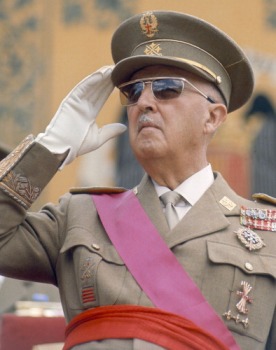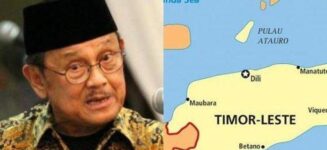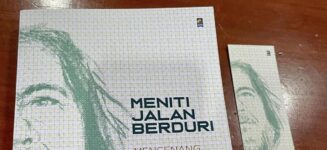The article was first published by Radio Netherlands on Oct. 29, 2010; also in https://jurnaltoddoppuli.wordpress.com/2010/11/02/soeharto-franco-%E2%80%93-a-lesson-from-spain/
” .. the hope to achieve justice for the millions of victims of human rights violations in Indonesia remains to be remote. Victimization of the victims continues.” (Asmara Nababan, 2009)
Two weeks on, the controversy on whether or not former President Soeharto should be awarded the title of ‘national hero’, has continued unabated. It reflects the depth of the influence and vested interests he had built during his reign versus the strong public resistance against these.
The issue would not have arisen had there been some sorts of tribunal or truth commissions to reveal his role and responsibilities on the political and humanitarian disasters that occurred during his dictatorship.
Elsewhere in Europe, postwar-transitions have stabilized democratic institutions and the overall consensus is that war crimes should neither be forgotten nor forgiven. Put simply, a general public acknowledgment and acceptability have been shaped about ‘good’ and ‘evil’, the ‘good’ and the ‘bad boys’, which are recognized by those in ‘grey’ category.
These processes were painful and traumatic, but they did resolve national schism and nurtured national cohesion by legitimizing the blame through war tribunals, condemning fascism — being the anti-thesis of democracy — precisely in order to strengthen democratic values – most remarkably in Germany where fascism took roots.
It is this choice that basically constituted Europe’s post-war political-moral paradigm. Spain, too, embraced it, but since Franco regime survived the civil war and fascism continued well after the WW-II, it’s generally more complicated to overcome fascist legacy, build up democratic institutions, and educate the public accordingly.
Another consequence is that while West Europe was able to resolve its past burdens by founding war tribunals and processes of public education, Spain has to rely mainly on the latter.
It’s true, war-tribunals in Nuremberg and Tokyo, in addition to numerous local court proceedings for perpetrators and collaborators, inevitably implied ‘victor justice’. However, they had powerful effect of public educative campaign: over decades they thus contributed toward the institutionalization of democratic values through mass media, seminars, government’s and civil society democracy trainings, school curricula, museums etc.
Some countries, notably (East) Germany and the Baltic, faced a double legacy — the Nazi Holocaust and the Soviet dictatorship — such that made their attempts to overcome their burdens more complicated.
But, this aside, countries burdened by bitter civil wars and conflicts like Spain and Indonesia badly need transitional justice through tribunals and truth commission and reconciliation. Differences between the two dictators seem obvious, but let’s focus on their similarities to highlight democratic transition.
Franco and Soeharto had a few parallels. Both came to power rather abnormally (Franco’s plain coup 1936, Soeharto’s creeping coup 1966); ruled three decades long; inherited a deep-seated schism, internal political and ideological conflicts; and victimized at least 500.000 people in the resulting civil war and massacre (Spain in the 1930s, Indonesia in the 1960s).
No wonder, the impacts of their rule lasted longer than their regimes. Indeed, rumors have it, that there had been ‘secret deals’ in both cases. A so-called “1975 unwritten promise” said if pro-Franco forces relinquished power after his death (1975), no one would be tried or pursued for past abuses.
In Soeharto case (May 1998) he actually prepared military chief Gen. Wiranto as his successor, but when Soeharto’s successor, B.J. Habibie, proposed a referendum on East Timor (1999), Wiranto might have used Soeharto’s “mandate” to ensure that his officers won’t be blamed for the aggression and abuses.
In any case, like Spain until recently, past abuses under Soeharto were swept under the carpet including those where Soeharto himself, in his biography, acknowledged his order to eliminate hundreds of urban thugs (gali-gali) in the early 1980s.
Worse, Soeharto had been implicated in greater crimes, including the 1965-66 bloody episode, the aggression and brutal occupation of East Timor, and atrocities elsewhere. The fact that his apologetic successors chose impunity, established ‘truth’ concerning the 1999 violence only, and with it, buried decades of East Timor tragedy – all these are comments on Soeharto’s influential legacy; hence, also his political-moral trademark.
Alas, you can only bent iron while it’s hot: not surprisingly, Indonesia’s long overdue truth commission failed to materialize (2006) as great momentum since the power transition in 1998 have been lost. Possibly, a new truth commission may be just too little too late.
Spain, meanwhile, has made remarkable progress in which the state condemned the dictator and denounced his crimes. It was also involved in projects to uncover Franco’s mass graves. By contrast, reburial of Soeharto victims, critical re-reading of New Order’s official history, film making and the like have to be initiated from the society and often met local resistance and book burnings.
In Germany, they have the Holocaust monument, but we haven’t contemplated a monument for Pulau Buru (Indonesia’s Gulach) where the nation could learn her tragic episodes from. Today, 65 years on, they finally have their first Hitler exposition in Berlin, which has been widely praised as ‘fair’ without triggering public hysteria.
Spain and Germany have thus come to terms with their difficult pasts by making Gen. Franco and Hitler their historically ‘negative symbols’: acknowledging, that is, their historic role, nonetheless pointing to their negative impacts for the nation’s values.
In Indonesia – quite the contrary – mainstream politicians are still pondering about making Soeharto a hero. Shame to the nation, and a humiliation to our new democracy. A long and uneasy transition. Soeharto, therefore, should be treated the same way as Franco and Hitler.
Only then, perhaps, we can put Soeharto hero issue aside once and for all, and learn more, and more fairly, from our own ‘Royos’ and ‘Salamancas’.
Angel Salamanca and Luis Royo are Spain’s national icons. Salamanca fought on the side of Gen. Franco in Spain’s civil war (1936-39) and subsequently joined Hitler’s war against Soviet Union. Royo is the exact opposite: a protagonist of Spain’s anti-fascism, he fought against Franco and, in France, against Hitler.
The experience of post-war Europe, in particular public discourses on fascist dictatorships in Spain, could serve an important lesson. Seventy years later, in Sept. 2004, the socialist government of PM J.L. Rodriguez Zapatero invited both at a national parade “to honor all citizens who had fought for their principles and values”.
However, Franco victims felt “dishonored” and many conservatives feared “disgrace”. The parade was boycotted and democratic Spain (since 1975) failed to start reconciliation. Old wounds thus remain.
But Spain is, of course, a unique case in Europe where authoritarian regime continued to prevail after the WW-II until thirty-six years later.
(Aboeprijadi Santoso Wartawan senior Radio Hilversum Belanda)



